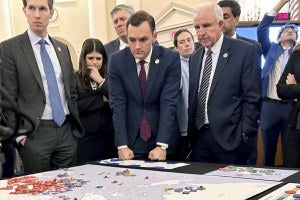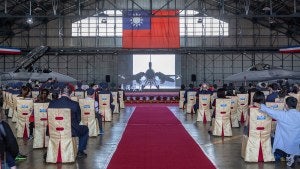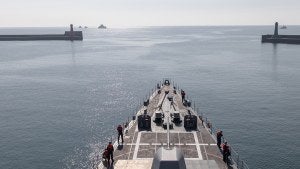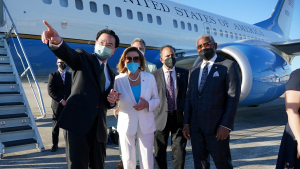The Debate on US Strategy in Taiwan-China Relations
 Play Podcast
Play Podcast
About the Episode
As tensions escalate between Taiwan and China, should Washington back Taiwan through increased militarily deterrence or prioritize reassurance and diplomacy with China? Quincy Institute’s Michael Swaine and the Council on Foreign Relations’ David Sacks debate the growing policymaker consensus for US military support to deter a Chinese attack, while considering dissenting views that prioritize political solutions for China-Taiwan unification from the US standpoint.
- U.S.-Taiwan Relations in a New Era: Responding to a More Assertive China, Council on Foreign Relations, June 2023
- How a reckless report could increase the chance of a crisis with China, Michael Swaine, Jake Werner and James Park, Responsible Statecraft, June 29, 2023
[Brian Hanson: INTRO: This is Deep Dish on Global Affairs— going beyond the headlines on critical global issues. I’m your host, Brian Hanson, with the Chicago Council on Global Affairs.
As tensions between China and US have escalated in recent years, the possibility of an armed conflict between The People’s Republic of China and the US over Taiwan has grown substantially. An important debate has emerged on how to avoid a possible war, with tremendous implications for the US, China, Taiwan, and indeed the world. There is much common ground in this debate and all sides want to avoid war, but there is disagreement over the best course of action, with each side in the debate fearing that the policies advocated by the other would actually inadvertently increase, the likelihood of armed conflict, not reduce it. Policymakers will have to make choices, and it is important for all of us to understand and think about which approach is more likely to preserve peace and avoid war.
To explore these issues, we are launching a two-episode series on Taiwan. Today we will explore the different positions in the US debate over Taiwan. Next week, we will focus on the internal politics of Taiwan around these issues. So today, we ask, why is there growing concern about a possible war between China and the US over Taiwan and what should be done to make conflict less likely? To help us navigate this complex topic I have with me two experts:
David Sacks is a fellow for Asia studies at the Council on Foreign Relations and was the Project Director on a new independent taskforce report by the Council titled, “US-Taiwan relations in a New Era”. And in this report, he advocates for a more a militarized approach for deterring China.
And we have Michael Swaine, a senior research fellow at the Quincy Institute for Responsible Statecraft and He is co-author of a piece “How a reckless report could increase the chance of a crisis with China.” He comes from a dissent perspective.
Our guests have very different perspectives on how Washington should navigate its role in the region...
(TEASER AUDIO SOUND)
“Michael Swaine: The United States doesn't oppose Taiwan eventually becoming part of China peacefully and through mutual consent, it's opposed to any Chinese effort to coerce the island or compel unification. It could say that. Does it? No.
David Sacks: But presidents have said that before,
Michael Swaine: Well, they need to say it again!
David Sacks: So, but right, right, right, but even when U.S. presidents said the formulation that you just put forward, the Chinese said not enough. You can't sell weapons to Taiwan, because that's fueling, Taiwanese adventurism, in their view, and so you need to cut that off…
Michael Swaine: Yeah, but that's not the, that's not the point.”
Ok we’ll get back to that, but let's start from the beginning... Where David and the CFR report says that conflict between the United States and the People's Republic of China over Taiwan is becoming increasingly imaginable....]
David Sacks: I would pair that with another sentence in the task force where we say that conflict is neither imminent nor inevitable. So, we shouldn't take a fatalistic view and say that we're going to have a war with China over Taiwan, but at the same time we need a smart... mix of policies to deter a conflict in the Taiwan Strait. And where we came out with that judgment is, first of all, looking at China's capabilities. We can have a debate, and I'm sure we will, over China's intentions vis a vis Taiwan, but I think the capabilities that the PRC is developing are pretty unmistakable. Preparing for a conflict in the Taiwan Strait has driven China's military modernization for decades now. When you look at Both what it has prioritized in its military and what it has deferred, these are geared towards, resolving the Taiwan question by force if necessary and deterring U. S. intervention on Taiwan's behalf. that's not something that has necessarily Started just in the last one, two or five years. This is a decades long process, but I would say that it has ramped up in in recent years. And so if you look at the hard deterrence and the military balance in the Taiwan Strait, I think it's unmistakable that it is tilting in China's favor. And if it continues to do so, our fear is that Xi Jinping will be tempted to use that instrument of national power. The second thing is again, Chinese intentions, and I think I'll be the first one to say we don't have, an amazing insight into what Xi Jinping is thinking and what's driving him, but we do know that he has publicly said the Taiwan question cannot be passed on from generation to generation, which could mean it. future generations of Chinese leadership. We also know that he has consistently linked unification with Taiwan to national rejuvenation, which he has stated, and other Chinese leaders have stated has to be accomplished by 2049, the 100th anniversary of the PRC. Just this past March at the National People's Congress, he called unification with Taiwan an essential element of national rejuvenation. So, this isn't somebody Who is really backing away from that. I think if you map out his statements, he's actually getting closer and closer to defining it as a core, part of this. If he has not already done so. And then I think the 3rd element that we would look at is Chinese actions and other context. What we see is a far more assertive and risk acceptant Chinese foreign policy, whether that's militarizing the South China Sea after pledging to the United States that It would not do so. Whether it's pressure on the Senkaku Islands and changing the status quo there, a border clash with India, or the crackdown on democracy and demolishing one country, two systems in Hong Kong, you know, this isn't the same Chinese foreign policy that we saw for decades. I think that under Xi Jinping, China is much more willing to take risks, assert its interests, and accept friction with the United States and other powers.
Brian Hanson: Michael, let me bring you in and ask you... Do you have a similar assessment, about the likelihood of war or are there other things that you believe should be taken into account in making a judgment about what is likely?
Michael Swaine: I do have a somewhat different take on this And I'm to a great extent not alone in this I certainly believe that the ability of the Chinese to use force against Taiwan has increased as David just said the Chinese have been increasing their military capabilities relevant to Taiwan for many many years now but the important point is the issue of whether or not the Chinese think that they need to use those capabilities to engage in kinetic force against Taiwan, whether or not there has been some kind of major movement towards the use of outright force and there, I think the picture is far, far less clear, in terms of military capabilities and actions. What we have are Chinese military sorties, displays, and exercises. That are mainly intended to deter both political behavior and ultimately possibly U.S. intervention in a war over Taiwan if one were to occur. And these kinds of activities have increased, not because the Chinese have decided they're going to go to war over Taiwan, but because there is an interactive dynamic going on between Beijing and Washington that alarms both sides. That makes both sides think that the other is operating under the other's worst case assumptions and leads them to do things like build up their military and for the United States erode the one China policy, move closer to Taiwan, increase its military capabilities vis a vis Taiwan. So, it's a dynamic in that regard. Secondly, there is an anti-secession law that the Chinese passed in 2005 with three conditions that they would have to have met if they were to use force against Taiwan, none of these conditions are yet in existence you have repeated statements by Chinese officials that they maintain a priority in their policy on peaceful unification which was part of an original understanding with the united states that goes back to the 1970s, which was peaceful unification for one China policy. Now, Xi Jinping has probably stated this commitment to peaceful unification as much or more than any previous leader. So, you at least have his open public statements. And we've seen repeated statements by the Chinese that the U S is eroding its one China policy, but by implication has not discarded it. And so, it's still put some real stock in the U.S. maintaining that one China policy, which however is being eroded. But nonetheless, the Chinese haven't given up on it. and they've said in fact that if the one China policy were to be abrogated, that would be grounds for triggering much more forceful action. Now you also have the view of many career China military specialists, including intelligence officials who believe that the primary Chinese strategy for deciding Taiwan's fate remains Peaceful, but likely to involve growing levels of different types of incentives and coercive actions alongside, as I said, a stronger deterrent capability against U.S. intervention. But there's no clear evidence that any high level of coercion is inevitable or pegged to a specific timeline. Now, David mentioned the 2049 date of rejuvenation. Yes, it's true. Xi Jinping has said, rejuvenation and unification should be part of the same thing. And he's talked about 2049. That, in my conversations with many, many Chinese, does not constitute a hard deadline by which we've reached 2049, China hasn't been united with Taiwan, we're going to war. This is a statement that's made. in order to support certain types of political objectives, primarily to a domestic audience that shows that the leadership is not ignoring or not looking at the Taiwan and not ignoring the Taiwan issue but is in fact focused very much on that issue and the need to resolve it. And of course, by 2049, Xi Jinping will almost certainly not be in office. So, we shall see what kind of Policies actually evolved between now and then, but I don't regard that as a hard deadline. And then finally, we have the fact that the costs and risks involved in attacking Taiwan remain extremely high for China politically, military, economically, and image wise. Many studies and crisis and war simulations have been done over the years showing the high costs involved. It's nowhere near a kind of slam dunk for China, far from it, to attack Taiwan successfully. And it's far from clear that there's some magical point at which China will think it has become a slam dunk for it, or even worth the risk of taking. So, there's a lot of reasons to argue that the Chinese... Want to avoid conflict, they're not thinking conflict is inevitable, they're not preparing to attack Taiwan. So, the point is to maintain a level of assurance. A long tide deterrence that doesn't push the Chinese into a corner that doesn't make them think that, well, their calculations are wrong. Looks like they're gonna have to go to war and try to seize Taiwan by force. We're not at that point yet, but I'm concerned that we could be evolving in that direction. And I'm sure that David is concerned as well. And the point is that the dynamic that's moving us in that direction is an interactive one. It's one that we are influencing as much as the Chinese are.
Brian Hanson: So, there's so much in there to unpack. And I want to bring you in, David, just on one of these points. It was really the last one that Michael mentioned, which is this interactive dynamic. I mean, people talk about the security dilemma, right? One side in order for protect itself takes actions that the other side sees as aggressive. They respond with actions to protect themselves. The other side sees as aggressive and you can end up with an unintended spiral, that can lead to conflict through this. I'm sure this is something that came up in the discussions in the task force. how do you view and how did the task force think about that dynamic in coming to a judgment and we don't know, right? you pointed out originally, nobody has great insight into what people are thinking, but how did you all resolve that issue and why'd you come down where you did?
David Sacks: So, I actually agree with Michael here that, this is an interactive dynamic and there are three main players here, Taiwan, China, the United States, and moves by any of those sides are influencing, reactions from the others. and, you know, this was a debate, and a discussion as part of the task force, Essentially, who went first? Who is really driving this and causing others to act in a defensive manner that others view, in an offensive way? And I think that if you map out the coercive activities that China has levied vis a vis Taiwan, they far outstrip Any moves that the United States has made to quote erode it's one China policy or anything that you could say that Taiwan has done to move towards, you know, de jure independence or beyond a point of no return. we had 8 years of my NGO from 2008 to 2016 KMT, pro engagement with the PRC. They signed two dozen agreements, building cross strait ties. Actually, Taiwan's defense spending declined as a percentage of GDP, as well as in absolute terms. but at the same time, China's military modernization... went ahead. The number of missiles arrayed opposite Taiwan and the Taiwan Strait increased dramatically. China's nuclear buildup continued. The capabilities that it needs to deter or prevent U. S. intervention, you know, such as anti-ship ballistic missiles, all of that continued. While the United States and Taiwan were both not really doing anything to address this military concern. So, if you want to look at that, I think it's clear that in the military context, China regardless of cross strait dynamics, has continued to plow ahead. And even at the end of the Ma administration, before President Tsai took office, China, ended the diplomatic truce, and flipped one of Taiwan's diplomatic partners. When Tsai Ing wen came into office in May of 2016, in her inaugural address, she actually reached across to the PRC and had what I thought and many analysts believed was a creative framework for cross strait relations within a one China context, and the PRC rejected it out of hand, called it an incomplete test paper, has refused to speak with President Tsai's administration for nearly eight years now. The economic sanctions levied against Taiwan, the pressure, the political interference has all continued. And yes, you could say that the United States now allows Taiwanese officials, into certain federal government buildings in Washington, which it hadn't done. Or you can say that Taiwan has, changed the textbooks that it uses to teach students or puts more of an emphasis now on, teaching, indigenous languages. But if that's your basis of evidence for Taiwan doing provocative things to China or the United States provoking China, then, you know, I think that's Quite a flimsy case. And to me, and I think to us, it was clear, you know, which side is really applying coercion to the others in this scenario. And I just wanted to just touch on one other thing before I hand it back to Michael. I think that we should be a little bit humble about understanding or, thinking that we know for sure what Xi Jinping's cost benefit analysis is. I mean, in the minds of the U.S. intelligence community and policymakers, Putin would have been crazy to invade Ukraine. You know, and the director of the CIA traveled to Moscow and said, if you invade Ukraine, the costs to your economy, to your society, to your military are going to be enormous. You shouldn't do it. And still, he went in. And he continues to bear an enormous economic, societal, and military cost because he views Ukraine, frankly, in a very similar way that Xi Jinping views Taiwan, which is, this does not deserve sovereignty, this is not an independent country, it is some kind of renegade or breakaway, society that must be brought under, the central government's rule, either in Moscow Beijing. And so, again, I think that if we were in Beijing's shoes, we might say, this is an enormous cost. Why would we go do this? But I think that we are kind of mirror imaging here and saying, what would be rational for us? Again, I would be the first one to admit, I don't know how Xi Jinping views the costs and benefits, but I don't think that we can say one way or the other. this is something he would never contemplate because the costs are too high. or, that this is something that he would absolutely do regardless of the cost. So, I think we need strike a middle ground and question both of those assumptions.
Brian Hanson: David, one of the core recommendations of the report is for the U.S. to. urgently, bolster deterrence and shape Chinese leader Xi Jinping's calculation in ways that will raise the costs for aggressive action against, Taiwan and indeed the report warns that if we don't do this, the odds of a military conflict over Taiwan will increase. Can you unpack this for us? Kind of what does this mean? What kind of measures should be taken? And also You know, it strikes me in the Russia parallel that you just, laid out, it's hard to imagine. I mean, Russia is paying big costs, right? Does the kind of deterrence action actually going to change those calculations? Why would we think that this would, you know, if it didn't deter Putin, why would we think in this case taking these kinds of actions would deter Xi?
David Sacks: I think to us, as we say this explicitly in the report, despite all of the military modernization we've discussed yet, I don't think that China, as of today, in July of 2023, has a viable military option. At the same time, I think that it will develop one, later in the decade and we can debate whether that's 2027, 2030, et cetera. What the director of the CIA has said is that Xi Jinping has tasked the PLA with having a credible military option by 2027. I think that given that fact or given that judgment that we reached, we can essentially do certain things to increase deterrence and push that further into the future. So that China delays having military option that it is confident. And so, what that means for us is that we should do things ourself. The United States, in terms of our force posture in the region, much more coordination with Japan, which I think is really the linchpin of a U. S. Defense of Taiwan. If the president decides to do that, Japan would be critical, and I don't think we can understate how important Japanese, assistance and cooperation would be. There are also things that we can do with Australia, and I think AUKUS is a good start. We've seen the U. S. Philippines make important announcements with additional sites, four additional sites earlier this year for basing options, and there's questions about whether we would be able to use those during a Taiwan contingency, but I think that that's progress and a lot that we can do with Taiwan, you know, I think that again to just talk about Ukraine for a second after Russia's initial invasion in 2014 and its seizure of Crimea. U. S. Ukraine security cooperation really ramped up and took qualitative leaps forward. But we still don't do a lot of those things that we did with Ukraine with Taiwan. So, we don't have joint exercises between the U. S. military and the Taiwanese military. We don't have any form of joint planning. we haven't built or helped Taiwan build an NCO core, like we did with Ukraine. So, I think that there's a lot that we can do to bolster Taiwan's ability to resist, which really is critical. if the United States decides that it will intervene and come to Taiwan's defense, we still need Taiwan to put up a stiff fight, and hold out long enough for us to come in. And so, I think that that's all the package. And I don't want to take away from Michael's response here. But think that the real debate is to what extent you pair that with reassurance. And that played out in the additional views that you see in the back of our report. And I would commend those views to anybody interested because that really does engage this debate. So, we have hard deterrence on one End of the spectrum. And to me, that is how you influence Xi Jinping's cost benefit, calculus. and then on the other side, there is to what extent should we reassure Beijing of our intentions vis a vis Taiwan, that we don't seek Taiwan's permanent separation, that we maintain our one China policy. And again, in the report. We do advocate that we maintain the U.S. one China policy, but the question of reassurance is really what a lot of this debate hinges on.
Brian Hanson: So, Michael, let me bring you in here. You've talked about reassurance and if you could address what about the kind of deterrent measures that the report lays out give you concerns and what are the nature of those concerns and you mentioned earlier in this conversation, the real importance of reassuring China that none of this means that the U.S. wants to permanently separate Taiwan from China. How do we go about doing that given the high levels of distrust in the relationship today?
Michael Swaine: Well, first, let me just say a few words about the dynamic here. And David has said that there is no question there's an overwhelming amount of indication that the Chinese are driving this dynamic in a negative way. I wouldn't reject the idea one bit that the Chinese are taking actions and doing things that are in many ways destabilizing because they are not pegged to a sufficient enough level of deep assurances of their continued commitment to peaceful unification. However, having said that, I think that the Chinese, as I said before, are very hesitant to use force. And secondly, I think they are responding to a slew of different actions. That the United States has taken over the years, and they go back as early as 1992 when first, President H.W. Bush directly rejected an agreement with the Chinese about arms sales to Taiwan and decided to sell F 16s to the Taiwanese after telling the Chinese that the U.S. would not do so. So, you had the beginning there of a period of time where U.S. commitments began to be eroded, and it has continued in varying ways over the years. The U.S. has stopped affirming that it would accept any outcome of the Taiwan situation arrived at peacefully and without coercion, including unification. That used to be a staple of U.S. statements. U.S. administration now does not say that. It's failed to explicitly reject the increasingly common notion that Taiwan is a strategic location critical to the U. S. and allied security and development interests, and therefore, by implication, must be kept separate from China. That is the clear implication of that statement. And that argument is a fundamental part of the Council on Foreign Relations Taiwan report that Taiwan is a vital strategic location that the Chinese, if they gain control of it, would have a huge advantage to the American position in the region and put us on a very, very weak situation. That is a rejection of the one China policy. I'm sorry…One China policy openly says it would not regard Taiwan as being independent, as being in the interest of the United States. And yet, this is what's said by the council's report, and the council cites several times a DOD official, Eli Ratner, who made a similar comment in front of the Congress, a comment which I quickly want to say has never been repeated by the administration for a very good reason. Because that kind of comment about Taiwan as a strategic enclave is so diametrically opposite to the one China policy. So, you can't have it both ways. You can't be both making arguments about strengthening deterrence to such a degree and casting Taiwan as a strategic node for the United States. That must be kept separate from China and at the same time uphold credibly a one China policy. Can't be done. Now, the United States also continues to allow or undertake actions that undermine the unofficial nature of U. S. Taiwan relations. And David mentioned this himself. This has been going on for years. It fails to strongly oppose congressional delegations. It raised a very muted opposition to Nancy Pelosi's recent trip to Taiwan. It could have done much more, but it didn't. And it doesn't push back against congressional extremism nearly as much as it should. it now routinely and publicly asserts what's called the six assurances as a central part of U.S. policy regarding Taiwan, despite its non-binding nature. As a non-public guideline that was not stated openly by the U. S. for many, many years, and now it is. And finally, it continues to dispatch a significant number of U. S. military forces, trainers in this case, to Taiwan, while failing, again, to push back against calls from some members of Congress for the deployment of greater amounts of troops to Taiwan and possibly warships and joint exercises between the U. S. and Taiwan. All of these things very directly undermine the original intent and argument of the One China policy. So, the U.S. has been doing a lot to erode the One China policy and the Chinese have been engaging on that through their actions. To try to deter this continued movement now have they done it appropriately have they done it responsibly have they done it prudently in some cases? No, they have not but the problem is that the two sides do not really directly engage on this problem. They're not really saying to each other in a meaningful way. What can I do? Or what should you do that would be credible that would reassure the other side. They simply repeat their mantra. On the U.S. side, we still observe the one China policy, which is increasingly not regarded seriously by Beijing. And on the Chinese side, we still uphold peaceful unification, which many in the U.S., as seen by the CFR report, seriously doubt. What we have to do is get beyond this posturing and get down to some significant, substantive discussion about what would actually. affect the other side's calculus to make them less fearful that the original understanding between one China policy and peaceful unification is not being eroded to such a degree that it becomes meaningless. Because if we allow that to happen, and I think calling Taiwan a strategic enclave will do exactly that. If we allow that to happen, we are well on the path towards a conflict with China. And so, we just need to have deterrence, credibility and Reassurance credibility on that score. I'm very much in agreement with David, but I don't think that the CFR report begins to address what is effective and necessary levels of reassurance by both sides. It focuses almost entirely on the military dimension, the strategic interpretation of the value of Taiwan, the need for ever higher levels of military deterrence, putting the U.S. defense industrial based on a war footing. All of those things are front and center in this report, and all of that serves to just further reinforce the worst casing, despite some side comments in the report. Well, we still uphold the one China policy. We don't want the U.S. to do anything symbolic that might undermine it. That is very inadequate in terms of really putting credibility into what the reassurances should be to maintain stability on this vital question.
Brian Hanson: This is a really important point, and there is real disagreement here. I want to dive into a little bit and, David, there's probably a lot that you want to respond to. One of the things that I ask when you do, is could you address Michael's point about whether or not this claim of the strategic importance of Taiwan to U.S. military forces, and therefore we can't allow China to have control of Taiwan. how does that square with the one China policy in which say, the U.S. is open to a peaceful resolution of Taiwan, the Taiwan situation, if it's agreeable to, both sides, if it's such a strategic importance to the U.S. If you're China, doesn't that call this into question? And how did you all think about that?
David Sacks: So, on the One China policy, the bottom line I think for me is that we don't have a formal relationship with Taiwan. We don't have an embassy in Taipei. We don't have an ambassador to Taiwan that is Senate confirmed. We do not sign treaties with Taiwan. We have all of these cutouts because it is an unofficial relationship. If the evidence is that the Biden administration hasn't put sufficient pressure on a co-equal branch of government to do what it wants vis a vis Taiwan, then I'm not really sure what the argument is. the Speaker of the House will go wherever she wants, regardless of the party in the White House and what they want her to do. And I think that's just the reality... The other element that I want to raise is that we haven't really spoken about the Taiwan Relations Act, passed by Congress, signed into law by the President. We are a country, a nation of laws, and the TRA explicitly states that we will provide Taiwan with arms of a defensive character, which is exactly what we have been doing for decades, and that the United States will maintain the capacity to come to Taiwan's defense. And so, you ask yourself, given China's military modernization, given the threat that it poses to Taiwan, are we living up to the law and ensuring that we can come to Taiwan's defense if the president chooses to do so? And I think the answer is we need to do a lot more to ensure that we can. On the question of Taiwan's strategic location, again, that's an analytic Judgment. If you look at a map, Taiwan is less than 100 miles from Japanese territory. It is incredibly close to Okinawa, the Senkaku Islands. So again, we are bound by a treaty to defend that Japanese territory. If the PLA is on Taiwan's east coast, that will make it much, much more difficult, if not impossible to defend Japanese territory. You ask leaders, you look at the Philippines and whether the United States could defend the Philippines again where we have a treaty if Taiwan is in China's hands, much more difficult. So again, that is the reality that we're faced with given Taiwan's location in the center of the first island chain, and that's just what we wanted to highlight. Now, how I would square that with, again, question about whether we would oppose a peaceful resolution of cross strait... issues. I think the answer is of course not. If the Taiwanese people, 23 million of them, wake up one day and say, you know what? The PRC is the future, the East is rising, the West is falling, and we want to be a part of this great story, and they want to join the PRC peacefully, and in a non-coerced way, the United States would not oppose that, and we would have to adjust strategically to take into account this new reality, but we are opposed to a coercive or forced, resolution imposed on the Taiwanese people. And I think that as we debate this issue, we just can't get around what the strategic implications would be. And that's what we wanted to highlight. And you ask any, military planner in the United States what it would look like for the U.S. defense of our treaty allies if China had possession of Taiwan. It's a very different scenario. And I think that as Americans, we just need to grapple with that. But no, I don't think that we need to say we're going to permanently keep this out of China's hands because of the strategic imperative. But we just need to be aware what the strategic stake is.
Brian Hanson: So, I want to bring one more issue onto the table here, which is another longstanding U.S. policy has been called strategic ambiguity. And basically, in a nutshell, under this policy, the U.S. has chosen not to explicitly state whether or not it would come to Taiwan's defense and the rationale has been that this contributes to deterring China because they are concerned that the U.S. would indeed intervene. Not just with supplying weapons, but if there were conflict, the U.S. would come in on Taiwan side. And at the same time, ambiguity, has been argued that it checks Taiwanese adventurism or independence efforts because they can't be certain that if their actions provoked a response from the P.R.C. That the U.S. would be there. Michael, you are concerned that, this policy of strategic ambiguity is eroding. Can you talk about what your concern is and your perspective on the position the report takes on this?
Michael Swaine: Well, my concern is that the kind of balance of credible deterrence and credible reassurance is just disappearing. and that as the United States doubles down on deterrence, military deterrence as a primary way of trying to solve or stabilize the Taiwan situation, which the CFR report does, that process will lead the Chinese. took subsequent actions, by the United States, probably pressured by the Congress to make Taiwan into a de facto equivalent in terms of a security ally to Japan, to South Korea with equivalent types of commitments by the United States, which would eviscerate the one China policy. It would not have any effect. It wouldn't be in existence. And then the next step be Well, we should just get all this out of the way, have a policy of strategic clarity, and then subsequent to that if the Chinese still don't back down, then I guess we need to support Taiwan as an independent state to really show the Chinese we mean business. The point is, there is no level of U.S. military deterrence and separation language that is going to deter the Chinese from using force. If there is not a credible level of reassurance linked to original understandings regarding one China in place, you cannot deter the Chinese simply using military force and think they will back down on this for a host of reasons. I once briefed the command of the Pacific command in Honolulu, along with two senior members of the U.S. intelligence. Community and I was asked this direct question, what does it take to deter China from attacking Taiwan? And this was a military man asking a military question. And the answer I gave was if you don't provide sufficient levels of political and diplomatic assurance that are credible to the Chinese, there is no level of deterrence that will prevent the Chinese from attempting to use force. And if they lose the first time around, they'll keep trying. The two senior members of the intelligence community with me at that time did not disagree. And today I would dare say that viewpoint hasn't changed. In fact, it's probably gotten stronger. And people I know who've been in the intelligence community and follow this very closely continue to hold that view. So, we're playing with fire. If we think that military deterrence is going to solve this problem, we have to be much more serious about what kind of understandings we need to have with the Chinese. that will be reassuring and not simply assume that, oh, Chinese are going to attack Taiwan. We have to keep Taiwan separate from the China for strategic reasons. All of that just reinforces the kind of worst casing that we do not need to have dominating this issue. And that's what I'm afraid the CFR report contributes to.
David Sacks: So, on reassurance, Michael. In actual steps, what would you say to the Chinese, and what would you do and not do with Taiwan to show that your words are backed up with actions, so that Xi Jinping would wake up one day and say, I am reassured.
Michael Swaine: I think the question is when you talk about reassurance, you have to say, what is it that you can say that will make the Chinese think that you haven't taken the possibility in the future of unification off the table? That's the important thing. If you exclude that sense of that option for the Chinese, then they have no choice. So, you have to keep that door open, even if under current conditions, you don't believe that the Chinese are going to necessarily say, okay, everything's fine. Everything's back to what it was. We're fine. You want to resist taking that kind of extreme motion that will put the Chinese in the corner. And I have a whole, host of things the United States could say to reinforce this- the United States could say it's convinced that it's in the interest of both countries for the two sides to establish consultations and bilateral international issues on common interest, including Taiwan. It's important for the United States to say, that it will accept any resolution of the cross-strait issue that is reached without coercion, as in, and is endorsed by the people on both sides of the Taiwan Strait. It's irrelevant if that is not possible today. But saying that is important. United States could say... It does not regard Taiwan as a strategic location vital to the U.S. security position in the Western Pacific to be kept separate from China for that reason. The United States doesn't oppose Taiwan eventually becoming part of China peacefully and through mutual consent, it's opposed to any Chinese effort to coerce the island or compel unification. It could say that. Does it? No.
David Sacks: But presidents have said that before,
Michael Swaine: Well, they need to say it again!
David Sacks: So, but right, right, right, but even when U.S. presidents said the formulation that you just put forward, the Chinese said not enough. You can't sell weapons to Taiwan, because that's fueling, Taiwanese adventurism, in their view, and so you need to cut that off…
Michael Swaine: Yeah, but that's not the point.
David Sacks: So, would you keep, the substance of selling arms to Taiwan? Which China objects?
Michael Swaine: Oh, sure. You, you... You would keep the substance of selling arms. Look, we've been selling arms to Taiwan for years and years, and the Chinese have not crossed the Rubicon to saying, well, the jig's up we need to use force against Taiwan. Depends, of course, on how much arms, depends upon the specific nature of the military assistance that's being given to Taiwan. I think where the line lies here is. A - you don't want to have statements that make it seem like you want to permanently separate Taiwan from China, which is in fact being done now with these statements about strategic. And B - you don't want to provide arms to Taiwan from the United States that really look like Taiwan has now become a full security ally. Now, what would that mean? That would mean deploying forces to Taiwan, U.S. forces. That would mean deploying warships to Taiwan on a regular basis as a sign of reassurance. Where do you stop the steady slide of U.S. assistance to Taiwan if you haven't got Credible levels of assurance on the other side? There is an open ended, it's an open door here. And you know, as well as I do, David, that the Congress would love to move further in the direction of providing the kind of assistance to Taiwan that I, and many others believe we would cross the red line for the Chinese.
David Sacks: I think that where we differ here, and again, I understand that reassurance is part of the deterrence equation and we tried to address that, although I know it was insufficient for Michael, but I…
Michael Swaine: Not just myself, I should say many, many other people.
David Sacks: Okay, but where, I think that we differ is that the steps that Michael has outlined in terms of reassurance, I do not think are sufficient for the Chinese. So, if we made the statements that he says, they would say, well, you don't mean it. Prove it to us that you mean the words coming outta your mouth. Which as if you say, okay, well what would you like us to do? Again, no arm sales, no high-level visits. don't negotiate any kind of agreement with Taiwan on economic science and technology, cooperation, or anything. I mean, the amount of minutiae that the Chinese talk about in terms of what they object to vis a vis U.S. Taiwan relations.
Michael Swaine: Those things are all, part and parcel of the back and forth between the U.S. and China for years and years. And the United States has done things, sold arms, done this, done that. And the Chinese have not said OK now you’ve really crossed the line and they look like their gonna take action. The Chinese don't want to take military action against Taiwan. What I'm talking about are the serious, what I would regard as serious red lines that impinge directly on Taiwan. On the notion that the United States remains open to the possibility under whatever circumstances in the future that China and Taiwan could one day be united. It's those types of actions that directly strike at that confidence on the part of the Chinese that really does cause the problem. And if the United States is just ignoring those kinds of concerns on the part of the Chinese and goes ahead and doubles down on military deterrence while providing such weak, weak assurances on the major issues regarding One China. Then, I mean, we will continue down this path towards a slide towards crisis and conflict.
Brian Hanson: Michael Swaine of the Quincy Institute and David Sacks of the Council on Foreign Relations -- I want to thank you both so much for having a serious conversation about alternative approaches for what's at stake in this. Thanks for being here!
Michael Swaine: Thanks, Brian!
David Sacks: Thanks for having me, Brian!
And join us next week for part two of this series where we focus on the politics around these issues within Taiwan and the alternative views there on how to best preserve peace between China and Taiwan.
[Brian Hanson: OUTRO: And thank you for tuning into this episode of Deep Dish.
As a reminder, we wanna hear more from you, our listeners. So send us an email, or better yet, a voice memo to deepdish@globalaffairs.org -- You can suggest issues you'd like us to cover, guests you'd love to hear from, or you can just let us know how you think we're doing!
And if you're looking for more Deep Dish in your podcast diet, tap the follow button in your podcast app so you can get each and every new episode as soon as it's released. And if you think you know someone who had enjoyed today's episode, take a second tap share, and send it to them as well.
As a reminder, the opinions you heard belong to the people who express them and not the Chicago Council on Global Affairs. This episode is produced and edited by Kyra Dahring and mixed by Frank McKearan at Aphorism Productions.
Thank you for listening. I'm Brian Hanson, and we'll be back next week with another slice of Deep Dish.]






Related Content
 Defense and Security
Defense and Security
The strategy debate has serious implications for both Taipei and, by association, the United States, argues Ethan Kessler.
 Public Opinion
Public Opinion
Should China invade Taiwan, 2022 Chicago Council Survey data show most Americans would support sending arms but not US troops.
 US Foreign Policy
US Foreign Policy
Washington has started selling arms that serve a "porcupine" defense strategy to Taiwan. Whether Taipei fully embraces this new approach remains to be seen.
